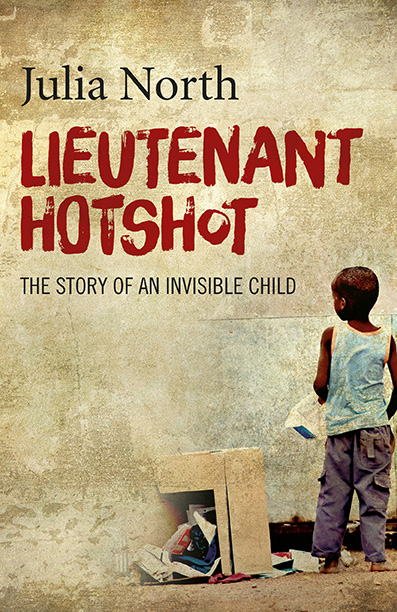Lieutenant Hotshot
Nothing is too bad to be forgiven.

Nothing is too bad to be forgiven.
Nothing is too bad to be forgiven.
“You are in the valley now, Modetse, but one day you’ll come out on the mountain,” is what Mama Zuma tells him, but having been brainwashed by the horror of the Lord’s Resistance Army what chance can Modetse ever have of truly finding himself again, or rescuing his little sister Thandi?
Click on the circles below to see more reviews
Balancing a ‘message’ with pacey and involving narrative can be tricky. Lieutenant Hotshot, however, manages to walk the elusive line. Right from the get-go (the book is dedicated to the children of Joseph Kony’s Lord’s Resistance Army) we understand who the antagonists of the story are and thus, by extension, who to good guys are, also. No moral greyness here – setting out like this, the only query of doubt the novel can surely raise is whether or not the protagonist is going to get out of this ‘invisible child’ story unscathed. It is a testament to North’s skill as a writer that we soon don’t care about the certainty of any outcomes. Modetse is a young boy, living in the city or town slums of, one assumes, Uganda or the Congo. A glue sniffer, and hemmed down by the love he feels for his sister (and the lack of security he can provide for her), Modetse’s life is tough, with a suitably uncompromising voice to match. But that voice is also very compelling. The idiom is easy on the eye, with scant punctuation to stem the flow of narrative. Quirky similes and an abundance of definite articles pepper the pages, keeping every line interesting: the sun sits in the sky ‘like a big copper coin'; Modetse’s sister looks at passers-by with ‘big brown eyes like the honey’ whilst begging for scraps and small change. There is something equally compelling about the shadowy, shamanistic world that North evokes, with objects, places, and even body parts taking on independent life. As Modetse looks out over his life and situation, his mind is and imagination is described as separate from him, showing him things, reasoning with him. Magic is never far away. The Christianity the novel describes is one of opposition: ‘Don’t worry if things don’t happen all at once; if your emotions go up and down,’ says Dr Zuma, attempting to help recover Modetse’s childhood. ‘It will go back and forward. God and the devil are fighting over you.’ The reader may suspect that North shares her views with the book’s means of salvation – and in that respect, we are back to the ‘message’. No doubt, the author is concerned with her subject, the rights and wrongs, and the plight of the invisible children. But for me, the ultimate strength of the book lies in its ability to describe Modetse’s world. The believable, inventive and incredibly moving voice North has created is a startling invention, and a great accomplishment. I very much look forward to see what this author has in store for her readers next. ~ Anne Jensen, Amazon review
As you can tell by reading speed, I found it quite gripping and it has been distracting me from real life! Read through in 2 sittings interrupted only by my body insisting on sleep. The characters felt believable to me. An interesting exploration of Stockholm syndrome, for sure. There were a number of aspects of the leaders interactions with the kids that reminded me of the Patty Hearst bio - worth a read if you haven't. That process of assimilation into the cause worked well for me; the redefinition of normal. Your matter of fact descriptions of things, especially glue addiction and the rape, were strong but not overly sentimental. The relationships, and the way your lead looks out for other boys when he can, let us believe in his inherent "good" nature so our sympathy for him can be retained; essential in a redemption story. The showing of the two different kinds of baptism was fab, really strong writing in both sections. Gave me a lot to think about in the nature of faith and how the trappings of many things can look similar. Enough debate and exploration to hold the atheist; it really wasn't as simple as "our god is better than yours", which was reassuring to see. ~ Emmzzi, writer
I was completely sucked in. On Saturday evening I was engrossed for hours on end and ended up dreaming about it both Saturday night and last night. Believe me, few books have that effect on me. I felt that I was on an emotional rollercoaster with Modetse. You managed to capture what seems to me to be a very authentic and honest portrayal of what these children must have gone through. In particular, you made the descent into darkness and the almost impossible climb back out understandable for me. As a result, I could definitely empathize with Modetse and the other boys, as well of course as with Thandi. It forced me to look at those who help or maybe appear to push their help through their eyes, understanding why there would be the resistance and hostility. The Stockholm Syndrome of being in the LRA under Mobuto's leadership also became relatable. What a huge writing feat that is. ~ Tim Bertram, author